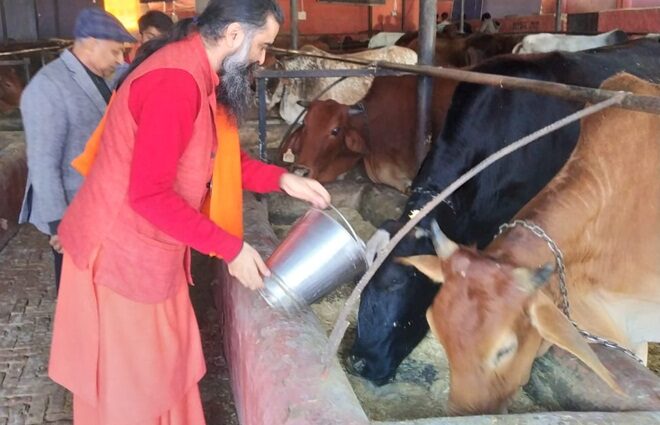Dr SP Gupta
Even as the country’s health system is grappling with the second wave of Coronavirus pandemic, public health experts have warned of a third wave which could be more ferocious than the prevailing one.
While one hopes the crisis to die down sooner than expected and its impact on people is minimal, necessary infrastructure must be put in place to deal with emerging situation that could put human lives at risk. It is quite obvious and natural that priority of the governments in that case would be to protect human lives and save them. In all likelihood, the issue of animal welfare would be of least interest for public authorities.
But a timely action plan could effectively address the challenge of maintaining animal welfare across the country in emergency health situation which triggers lockdowns and night curfews to prevent the infection.
Among the various measures that could ensure well being of milch animals reared in dairies and farms, and strays fed in pinjarapoles both central and local government should consider it essential service and exempt people engaged in such activities from lockdown restrictions. People involved in such activities had harrowing time during the nationwide lockdown last year causing fodder shortage for the animals.
Secondly, once lockdowns are in place outward shipment of live animals also get affected. There is fewer manpower available to take care of these animals. Since export is slow there is overcrowding of foreign country-bound animals at various farms thus restricting their movement. This considerably compromises their well being and welfare.
It has been noticed that pigs and poultries are the worst-affected. They are made to survive in little space and on limited resources. This results in various health problems for the animals with potential to eventually harm humans consuming them.
In order to address these issues, a multi-pronged approach is needed.
There has been clear evidence that income level of people has declined in pandemic times. Therefore, people although keen to donate for the cause of animal welfare may not be able to do so. This would mean fund crunch for hundreds of animal care givers in the country. A little financial support for such care givers through shelter houses and hospitals could go a long way in ensuring well being of animals.
A team of volunteers at district level could be authorised by the administration to work during pandemic times. Lakhs of stray animals suffer during lockdowns due to inadequate food and water. There is barely medical care available for them during movement restrictions.
In case of companies engaged in trade of animals, their premises should be frequently monitored and oversight mechanism should be strengthened. Further, provisions of animal welfare law should be better enforced.
In a commendable move, the Uttar Pradesh government recently issued directives to set up cow help desks in every district and provide medical equipment for cow-shelters (gaushalas). Covid protocols have to be strictly followed at these cow-shelters while thermal screening is mandatory.
Other states should take a cue from the sensitive approach taken by UP government and implement these measures. The central government could issue an advisory in this regard to all the states and Animal Welfare Board of India (AWBI) could exhort states to implement them.
 (Author is retired officer from Indian Administrative Service (IAS) and former Chairman of Animal Welfare Board of India)
(Author is retired officer from Indian Administrative Service (IAS) and former Chairman of Animal Welfare Board of India)

